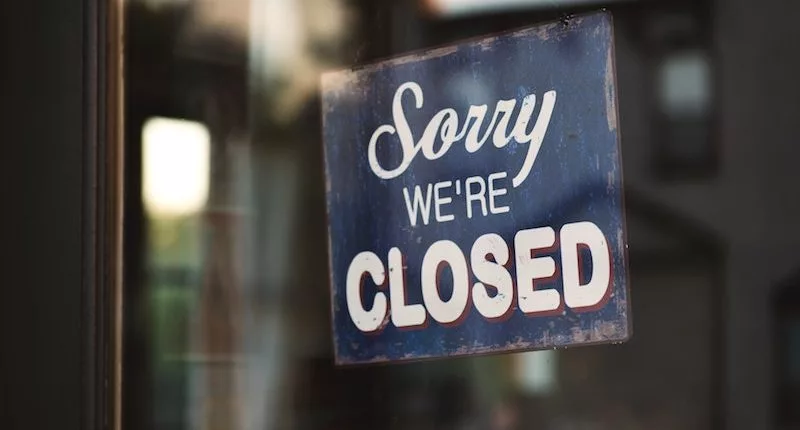Small Business Bankruptcy: What Should You Expect
What does small business bankruptcy exactly entail? There is important information you should know before filing, including preparing for the process.
Read here for the details!
Introduction
It’s tough out there for small businesses – especially in the middle of the coronavirus pandemic. Stay-at-home has all but decimated customer and client bases for SMBs all across the country since the virus first began to spread. In fact, over 100,000 businesses closed between March and May alone.
Those numbers continue to rise right alongside COVID-19 infection rates, and it really doesn’t look like things will change anytime soon. In the meantime, it’s highly likely that even more businesses will close before a cure or treatment even exists.
If you’re an SMB owner who is currently planning to close as a result of extreme financial hardship, you have options. Chapter 7 bankruptcy can help you shutter your business while also addressing unresolved debts. It may even be able to help you prepare to reopen a new business later on down the road.
Here’s what you need to know about this legal process.
What is Chapter 7 Bankruptcy?
Chapter 7 bankruptcy essentially liquidates property in an effort to resolve pending debts. A trustee, who is assigned by the courts, manages this process, dispersing funds from the sale of assets to creditors in the fairest and most equitable way possible. It may sometimes be referred to as a “wage earner’s plan.”
This type of bankruptcy is most often utilized by people who have high levels of personal debt they can no longer manage. However, it can often be applied to small business debts – especially if the owner is a sole proprietorship, a partner, or even a small-to-medium LLC.
How Does Chapter 7 Bankruptcy Work?
The Chapter 7 process starts long before you actually file for bankruptcy. In fact, according to U.S. code, you must first undergo mandatory credit counseling for at least six months. The goal is to help you avoid bankruptcy if other alternatives exist.
Petitioning the Courts
If you reach the end of the six months and still haven’t made any headway, you can petition the courts to approve you for the Chapter 7 process. You will need to provide a number of official forms, including a bankruptcy petition, a full list of your income and expenses, and a declaration of your inability to pay due to financial hardship.
Do You Pass the Means Test?
The courts will then review your information to assess whether or not you pass the “Means Test.” This is essentially a calculation that investigates whether or not you have the ability to pay some, or all, of your debts over time.
Assigning a Trustee
If you are approved, a bankruptcy trustee is assigned to handle your case. He or she will seize any non-exempt property for later liquidation; these funds are used to pay back your debts.
Attending a Meeting With Creditors
The next step in the process is to attend a 341 meeting with creditors. Under your trustee’s watchful eye, creditors have a chance to review your paperwork and ask you direct questions about your finances or ability to pay. If that sounds a bit intimidating, don’t panic – it’s common for creditors to simply not show up.
Liquidating Property
After your 341 meeting, your trustee will begin to help you deal with your debts. If any of these are secured (backed by collateral, such as jewelry), he or she may seize the collateral and liquidate it. The trustee also has the right to seize any other non-exempt property in an effort to pay down unsecured debts.
This does not necessarily mean you’ll lose everything you own, including the very shirt off your back. Some assets, including your clothing, your furniture, the home you live in and the vehicle you drive, may be considered exempt from this process. The goal is not to make you completely destitute, but to help you restore balance.
Discharging Other Debts
Once all sources of capital are exhausted, the courts will typically discharge all other remaining debts under your responsibility. This includes small business loans, lines of credit, and credit card debt.
In most cases, the trustee will require full closure of the business at this point. Rarely, they may allow the business to remain open, but require the owner to purchase liability insurance to prevent a recurrence. Every trustee has their own way of approaching the law on this matter.
So, What’s the Catch?
Chapter 7 bankruptcy isn’t right for every small business. In fact, it may be a poor choice if there’s a chance the courts may hold you personally responsible for the debt. Furthermore, there is also a risk that the courts may attempt to seize assets from business partners – including your spouse.
Furthermore, there may be issues with just how much debt you are able to pay off with the help of a trustee. Remember that the trustee’s main goal is to liquidate assets rapidly – they aren’t looking for big bucks. This may leave you with significantly less capital to pay debts.
You must also consider whether or not your debts can be discharged in the first place. Non-dischargeable debts include taxes, child support, fines, penalties, court fines, and any monies associated with personal injury lawsuits or settlements. You will still be responsible for these, even after Chapter 7 finalizes.
Still, Chapter 7 can be the right choice when a small business owner wants to put a trustee in charge. It is also a far more transparent way to close your business, resolve debts, or prepare for future success after the pandemic ends.
Is Chapter 7 Bankruptcy Right For You?
There is really no way to answer this question without knowing more about your situation. That’s why the first step you take should be to reach out to a bankruptcy lawyer who specializes in small-to-medium business law. An attorney can help you review your debts, your legal situation, and your alternatives to determine if other options exist. They can also work with you side-by-side to help you at every step of the process, protecting your interests and your assets from seizure.
That being said, there are a few indicators that may make Chapter 7 a strong contender for the best choice:
- You have a high level of dischargeable business debt
- You want to shut down your business and resolve debts
- You have a desire to reopen later on with less debt
- You want to protect yourself from personal liability claims
- You are separating from a partnership (leaving the business)
Contact a bankruptcy lawyer today for information on Chapter 7 bankruptcy. And remember: times won’t always be tough. You certainly aren’t alone in your struggle, either. A smart choice to fold now may mean better days down the road.
Are you in search for a certified attorney to represent you?
Let us help you find one today!



Thanks for the reminder that liquidation of property is also part of the bankruptcy process. A friend of mine is asking me to help them look for a bankruptcy attorney because she needs all the legal advice she could get before pulling the plug on her business. It’s been her dream to have he own business ever since I first met this friend so it’s a really huge decision for her whether she should call it quits or not.